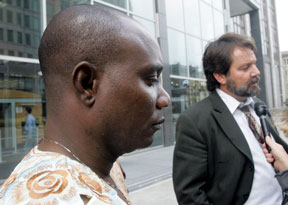CHARLENEM

A San Francisco jury has acquitted Chevron Corporation of any involvement in the deaths of two peaceful demonstrators at one of its oil platforms in Nigeria as well as any human rights violations that stemmed from a decade-old protest against the company’s production activities there.
The Dec. 1 verdict came just 12 days after Nigeria’s Vanguard newspaper reported that a woman and young boy in Warri, Nigeria, were shot to death after a peaceful protest over jobs and employment at Chevron’s Escravos facility.
In the federal class action lawsuit, Bowoto vs. Chevron, plaintiffs charged that the company aided and abetted the police force in the injury and torture of others involved in a 1998 sit-in.They argued Chevron was damaging the Ilajeland community’s fishing economy and curbing access to clean water.
The suit charged Chevron sent for the Nigerian military’s notorious “Kill and Go” squad and even transported them in helicopters leased by the corporation.But Chevron, which claimed that the demonstrators had taken hostages, countered that the Nigerian government was responsible for what transpired and the jury agreed.
Had jurors decided for the plaintiffs, it would have been the first time that a U.S. corporation was held liable for human rights abuses committed overseas.
“The bottom line here for Chevron and for other multinational corporations is the whole world is watching, you cannot get away with this stuff anymore in the Third World and you will be held accountable if not today, then tomorrow or next month or next year,” said plaintiffs’ Attorney Bert Vorhees.
Human rights activists said the verdict has significant implications, not just for Nigeria, but also for all oppressed people around the world.It supports an arrogance and culture of abuse in Nigeria that is repeated in places like Ecuador, Burma and Angola, they insist.
“What an American jury has said by this verdict is this is a proper way of conducting business and that cannot be acceptable,” said Omoyele Sowore, a Nigerian activist and publisher of http://www.saharareporters.com/, an independent news reporting website.
According to Mr. Sowore, history shows Africa was never decolonized after the Berlin Conference in 1884, where 14 European countries and the U.S. met to decide who would control what parts of Africa based on its resources.The condition is still so bad, he said, that most West African nations are still named after their resources, such as the Ivory Coast, Nigeria named after the River Niger, and Cameroon, after the shrimp found there.
“That tells you that Africa is not about its people, it’s about its corporations and you can tell that even when the Western world wants to intervene on behalf of Africa, they are more interested in intervening on behalf of chimpanzees, gorillas and baboons in African safaris than they are interested in helping Africans to get out of what the corporations have done to them,” Mr. Sowore added.
Africans should understand the ultimate solution to their problems lie in getting their acts together on the continent and overseas to include Africans abroad and Black people everywhere, he said.All will have to come together and fight for the dignity of the Black man, said Mr. Sowore.
According to Atty. Chimene Keitner, of the University of California’s Hastings College of Law, the case sets a broader trend towards ensuring corporate accountability.“The Alien Tort Statute lets victims of egregioushuman rights abuses seek redress in U.S. courts, even if they were harmed outside of the United States.It is well established that aiding and abetting, an international law violation itself, violates international law,” she said.
Akbar Muhammad, a longtime helper of the Honorable Minister Louis Farrakhan on the international scene and columnist, said the issue of corporate abuse has been brewing for a long time. The charges only came this far because of the tenacity and courage of those who exposed oil profits were at the root of the suffering of people in the Niger Delta region, he said.
Mr. Muhammad said local people have turned on the Nigerian government because it built oil wells, but they have no housing, jobs, or they have poor working conditions.The Nigerian government has yet to put pressure on the oil companies to make them spend more money on human development in the area, he said.
“Those who are charging Chevron and other oil companies are correct that Chevron is at the root of the suffering of their people in complicity with the government of Nigeria,” Mr. Muhammad said.












